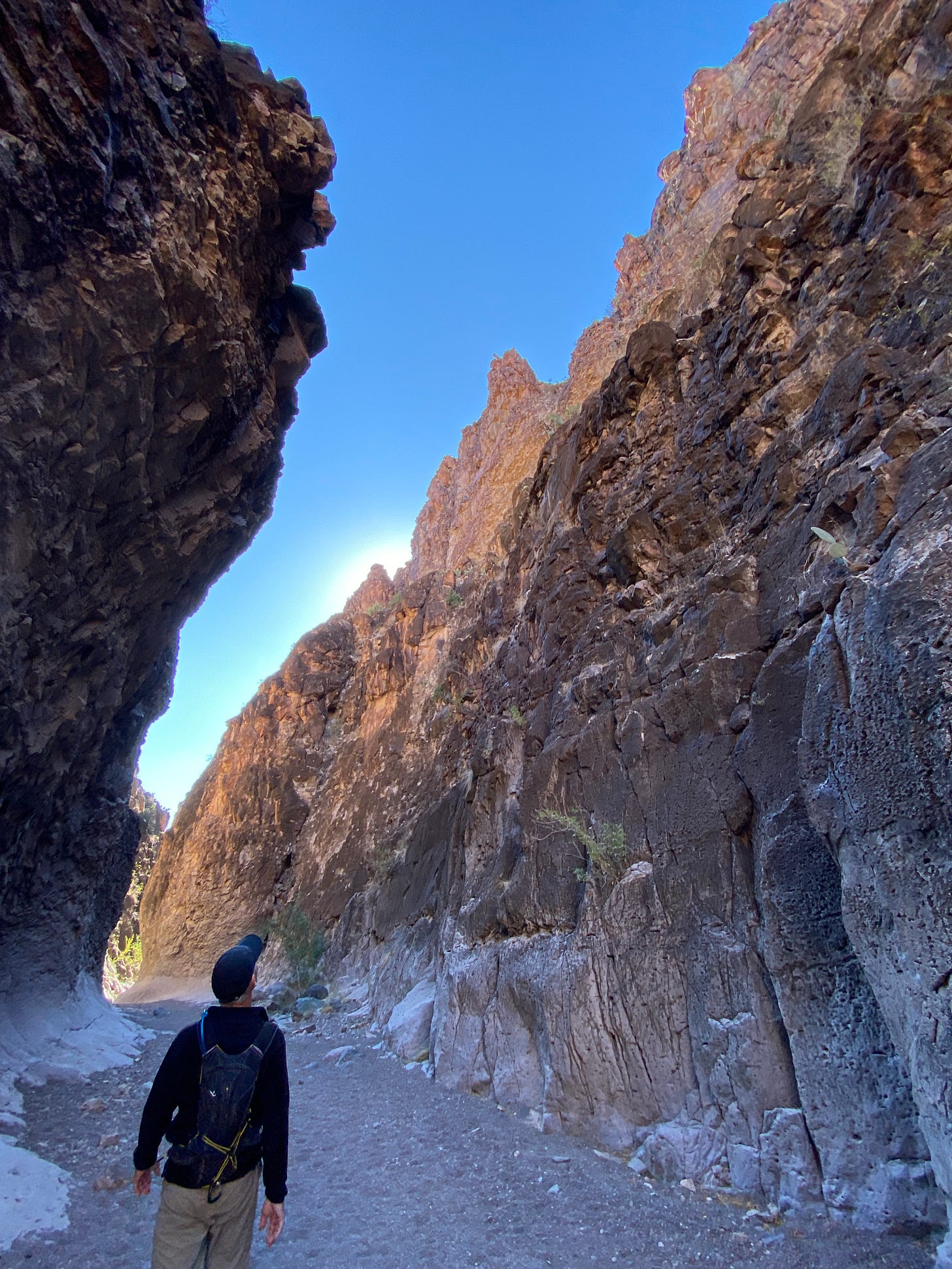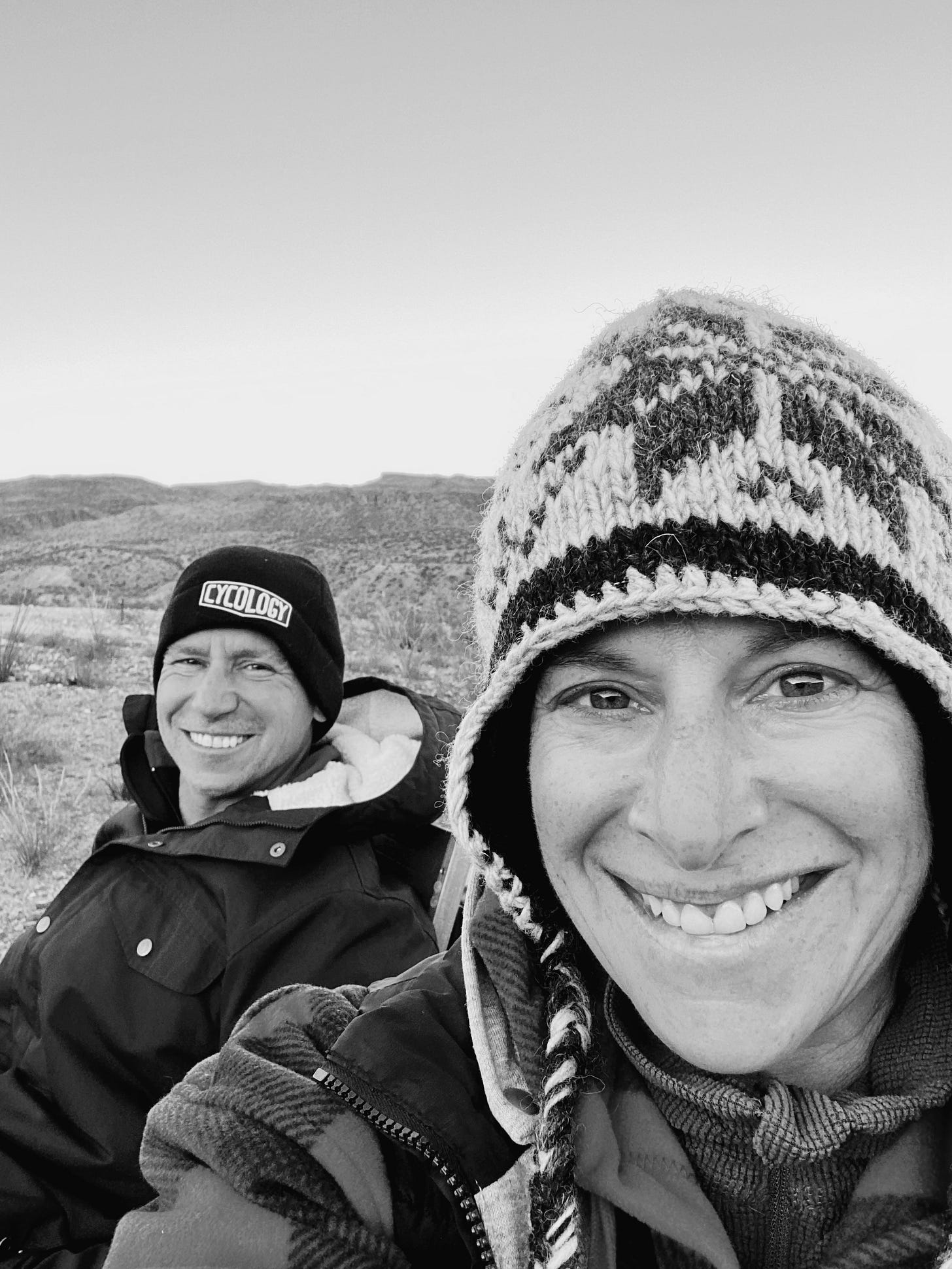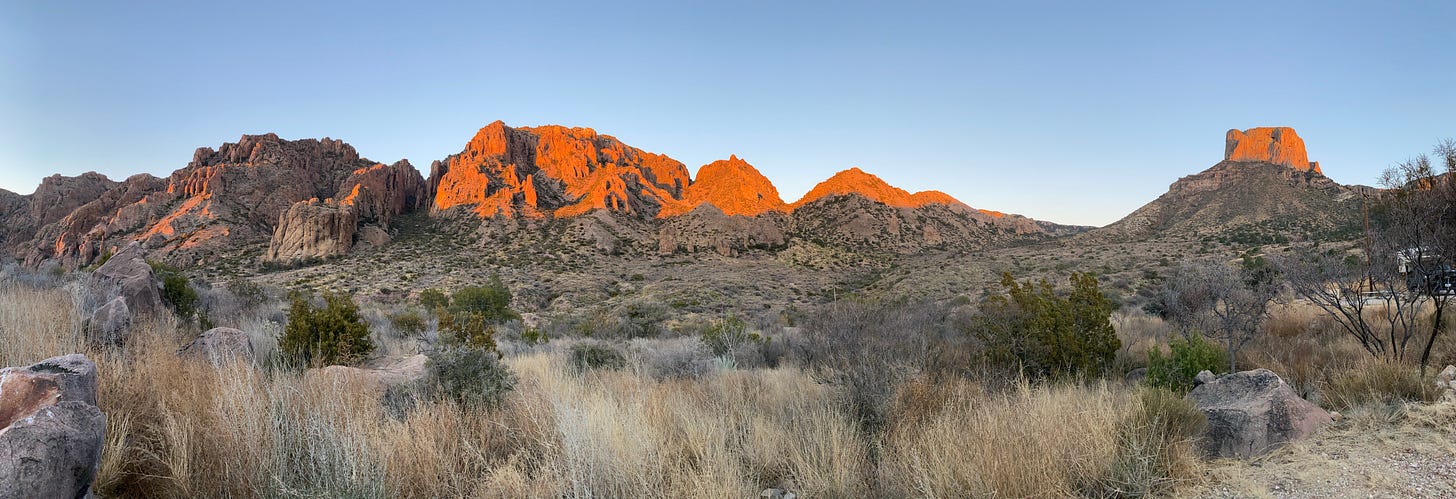Beware the Glochids! (and other challenges)
Journal Entry #22
February 12, 2022
We knew there were going to be some interesting challenges once we hit western Texas in early February.
First, the terrain is completely unfamiliar. The sheer emptiness, absence of humanity, miles undulating hills of limestone punctuated with dramatic buttes and mesas that cast shadows and seem almost eerily alive.
The flora is also alien in both the literal and figurative sense; it is both alien to us and it also looks as if it has come from outer space altogether. Tall ocotillos rising from the ground like so many huge upside down octopi, barbed tentacles in constant motion from the westerly breezes. Outsized prickly pear cacti with paddles the size of my head, creosote bushes with their strange aroma, and other cacti too numerous to name.
Then there is the weather which is notoriously unpredictable, particularly at this time of the year. Blazing sun that makes your skin and clothes hot to the touch and that moves morning temperatures from 35 to 65 degrees in less than an hour and nights that slide quickly below freezing with winds that can gust 20-30 miles per hour. It is both stunningly beautiful and also unrelentingly harsh.
Which brings me to some recent challenges that we have faced, starting with the attack of the glochids. I bet most of you you don’t know what a glochid is… Well, neither did we until we battled these invaders on a recent hike in the wilds of Madera Canyon. About four miles into our hike, Tom complained that he felt something stinging and prickling on his back. When we stopped for lunch he removed his shirt, shook it out and replaced it with another one, hoping this would help. It didn’t. On the way down he began to feel the same stinging on his hands, particularly if he touched another surface; his pants, holding my hand, adjusting his camelback, etc. As we made our way down the canyon he examined his hands but could see nothing. Still, the pain and sensitivity was worsening. Tom described the sensation as “mini splinters everywhere”. We returned to the van and I took off my backpack. In the outside pocket I had stowed my coffee thermos for the hike up— one of the insulated mugs with a push button to open the concave drinking area. I realized there was a gulp or two left from my morning fill up. As I placed my lips on the rim and took a gulp I realized it was a mistake. Suddenly, I was aware of a stinging, prickling sensation on my lips and tongue which felt like like tiny sharp shards of glass. We drove back to our campsite and spent the next few hours with Tom’s hand-held magnifying lens and a pair of needle nosed tweezers, attempting to yank out tiny microscopic barbs from our flesh. When all was said and done I had the bee stung lips that women try to achieve using Botox, but had trouble eating or drinking for several hours! Tom’s hands were sensitive and reddened from the jabbing and prying. Days later we were still finding them in our skin. When we finally had signal again we did some research and learned that the Blind Prickly Pear, common in these parts, which is the cactus with paddles but the one WITHOUT the long obvious spikes, is the culprit. And yet it looks so soft and innocent compared to the standard sharply barbed pear! It has glochid clusters; super tiny spines that look like harpoons. When they get embedded they are notoriously difficult to remove. If you have them in your skin every time you brush against something you are immediately aware of the pain. They were vicious! We can’t recall an exact moment but we must have brushed against one on our hike. Somehow, the glochidia were released and made their way into Tom’s shirt, fell on his hands, and ended up on the surface of my coffee mug. We learned our lesson— take great pains to avoid any contact with alien plant life (or more great pain awaits).
The weather has also presented us with some interesting challenges. Our goal was to stay south enough to avoid most freezing weather as we work our way west. We had done our research on average temperatures in the destinations we had in our sights and knew that, in some cases, we would be threading the needle by traveling to areas with altitude. What we hadn’t bargained for was two significant Arctic clippers traversing Texas just as we moved through. Tom, ever the engineer, had prepared for most of these challenges before we began our travels; we have a small gasoline fueled heater that warms the inside of a van. We have electric heaters attached to our potable, shower, and gray water tanks that are temperature sensitive and come on when a set low temperature threshold is hit to prevent any freezing in these tanks. But what we had NOT accounted for was how to protect our shower filtration system, which is under our bed, from freezing temperatures. Tom had one of those wake up in the middle of the night “uh oh” moments where he realized that this area might also be vulnerable to freezing. We knew that if we ran the shower on full hot before bed it would circulate through the filters and mitigate the risk, but what about the middle of the night when we were asleep? We brainstormed and landed on a possible solution. We would purchase a heating blanket (the kind you use on your bed) to wrap around the filtration system that we could switch on before bed if the temperatures were going to drop close to freezing. Sounds simple, but given we were out in the middle of nowhere and we had no access to Amazon delivery, the trip to the nearest Walmart was a solid hour each way. Also, in order to accurately monitor the actual outside and interior temperatures we needed to invest in remote read thermometers. On cold nights, Tom has taken taken to checking our various thermometers using his wristwatch light around 2:30am as a precautionary measure. Not fun given I am a light sleeper. Uggh.
You might be thinking, can’t you check outside temperatures on your phone? Well, friends, not when there is NO cell or internet signal, and even if there was one, not when the statistics on your weather channel are for the nearest named town… which is 40 miles away.
Which brings us to another challenge, that of “connectivity” - internet and cell signal and ability to reach information and people on demand. Of course, we knew this challenge would present itself, and we had also prepared for it, by signing up for both ATT coverage (through the Ford Transit) and our own Verizon plan and also installing a wifi booster. That said, “zero times zero is zero.” If there is no signal at all it doesn’t matter what plans you belong to or boosters you have — there is nothing to boost. And far west Texas, at least the parts where we have been spending time, is pretty much a desert of connectivity.
The things you take for granted and do so often, reflexive things like looking up information online, or making a call, or accessing a map, or sending a note or text, or glancing at the news are suddenly closed to you. It is freeing to be completely disconnected but also highly disorienting. We often reference real, super detailed, PAPER maps (which we actually LOVE) and make lists of questions we have for ourselves for later lookups. We take care to alert friends and family when we are heading into dead zones and try to plan calls before and after. Simply put, if you want to be in a place that has virtually no population, there’s a good chance there will be no signal. We were certainly spoiled by our prior urban existence where fast internet and constant access is a given. We now are heartened when, after an extended silence, we hear the pings of messages finally coming through and emails landing in mailboxes from the “known world”. Remember the delight you had back in the time when you opened a real mailbox and a stamped, enveloped letter was awaiting you? The joy of the moment as you opened it? When connectivity isn’t a given thing, it feels more like a gift.
All of our challenges are part of the adventure. They are the trade offs for being able to travel off the beaten track and experience the beauty of remote places in this intimate, up close, and personal way.
Tonight we sit by a cozy wood stove in the little casita where we are staying, taking a van “mini break” in relative civilization (Alpine, Texas). We have entered our sixth month on the road and after several weeks in the desert with more rugged terrain ahead, this short van break was a welcome treat. We’ve got a real couch to lounge on, a laundry room for our (very dirty) clothing, a big king bed to enjoy, a bathroom that can fit the the both of us. Tomorrow we head back out to the mountains. But for now, we are happy to have a warm house, no cacti, and fast internet. We take none of these things for granted.
There are times I am without words to explain how profound this journey is. It’s an amalgamation of joy, learning, exhilaration, exhaustion, struggle, accomplishment, partnership, love, missing/longing/worrying, laughing, friendship building, developing a nuanced understanding of people and of place. And, of course, experiencing the sheer wonder and soul lifting power of being amidst unadulterated natural beauty. I recognize this has been said many times before but I will say it again. Travel is transformative. Do it. Whenever you can. As often and as long as you can.











One of my happy places! (BBNP, especially the Chisos Basin)
What an experience with the Gloshids!! I suspect that New Mexico and Arizona may also have "alien plant" life. So be careful there. Onward on your incredible journey!